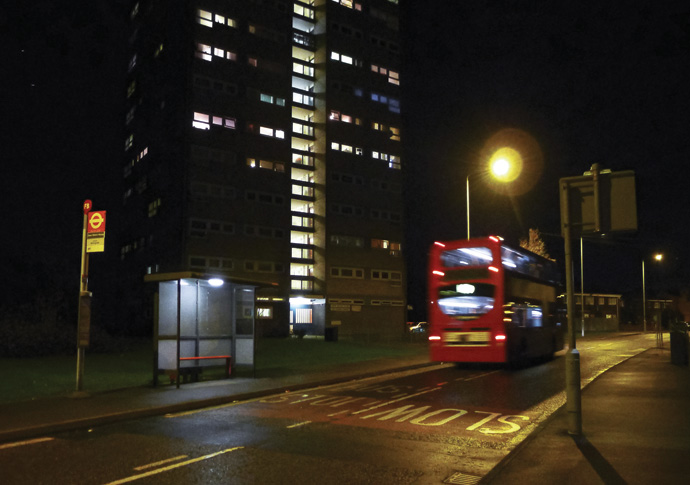Slight entertainment
Insults on a night bus leave Emma Goldman fuming... mainly because her witty riposte came too late!
Thursday, 8th December 2022 — By Emma Goldman

I ESCHEWED the environmentally unfriendly Uber option and took a night bus. Too crowded for me to sit down meant that I stood at the front near the driver.
Back when I was a regular such passenger, I was nearly always struck by the good-natured ambience of night-time transport, bad-tempered drivers notwithstanding. People were louder than in the daytime, but friendlier. Laughter would rock through the decks.
The bus on the recent night in question was packed with the recalled good humour. But there was an added aspect: the amount of people getting on with no tickets.
“Sorry, Boss – I’ve lost my Oyster.”
“I forgot my card – can I still get on?”
“Hey man, can I just go two stops down the road?”
The bad-tempered drivers I remembered seemed to be no more. Or at least, not on this bus. As ticketless streams arrived with more excuses than a class with no homework, he cheerfully nodded them through before taking off again through the night.
The bright lights, noisy chatter, and unlikely goodwill made me feel almost as if I were in the cheery pages of a child’s storybook rather than the dusty outskirts of the Westway.
A ragged man of indeterminate age dragged a trolley of belongings up the steps of the bus. Holding a bottle of Buckfast in his other hand, he didn’t even bother asking for the free ride, just muttered his slow way up the stairs.
Perhaps this driver was known in the area? A kind of social worker for the lost and careless who roam the streets of London when good burghers are abed.
But through the cheer, I gradually became aware of a different kind of voice. I looked up. It got louder and more insistent, over and over repeating the same variation on a theme.
“Get a move on, Baldy.”
“Oi Baldy, do your job and drive on.”
“Don’t annoy me, Baldy.”
The voice’s owner was a dark-haired man in his 30s or thereabouts. There seemed no reason for the barrage of mean-spirited insult other than just something for him to do.
The bus jolted to a stop. Opening his door, the driver announced he wasn’t going anywhere while he was being insulted.
“Just do your job and drive on, Baldy,” the man replied with what appeared to be his sum total of epithets.
“This bus ain’t moving, mate,” the driver reiterated. “Not till you get off of it.”
On cue, the passengers chorused approval in favour of the driver. But no matter how many times they echoed the man should go, he remained unmoved.
“Drive on, Baldy.”
The driver slammed his door and picked up a crackling radio. But before he could speak, a night patrol policeman got on. A piece of pure serendipity.
“Keeps calling me Baldy, officer. I didn’t come to work to be insulted.”
The policeman also seemed to hail from the child’s storybook. He gazed around him in a bemused and kindly way. And before he could say anything, the man moved away.
“You shouldn’t be so rude,” I said as he passed, finally doing my bit.
“Rude?”
“You’ve been rude. To the driver,” I repeated pedantically.
He seemed astonished at my intervention. Out on the pavement, he looked up through the window.
He raised his arms like branches in the thickness of the night. Like Rumpelstiltskin, he could have been about to vanish into the earth in fury. I waited for the inevitable name-calling. The bus rolled away.
“Old hag.”
Of all the injuries I had expected, that was not one of them. On a planet of shrinking language and catchall insults, linguistic expectations have become low.
And yet here was “hag”. A gateway, a sudden return to a more imaginative world.
A word with an impressive history, it meant sacrificial priestess in Old Norse and was later used onomatopoeically by Shakespeare when Macbeth seeks out the witches.
“How now, you secret, black and midnight hags. What is’t you do?’
Its synonyms are equally rich: crone, sorceress, beldam or gorgon.
As the bus rolled round a desolate roundabout, I thought of the forgotten art form of the insult. Specifically of how Shakespeare excelled at it. A Shakespearean character might be called “a boil” or a “scurvy companion”.
A “plague sorre”, or a “rump-fed runyon”. Or even an “embossed carbuncle in my corrupted blood”.
Through the blank window, I watched the flashing lights of the streets.
It was somehow reassuring that a man who had used the prosaic “baldy” had also accessed the flamboyant “hag.” Perhaps proof that, riled enough, we can all rise to the occasion.
Ay, there was the rub.
I cursed myself for not having been quick enough to retort in kind. If I ever saw him again I would be ready, though: “Away, you starvelling, you elf-skin, you dried neat’s-tongue, bull’s-pizzle, you stock-fish!”